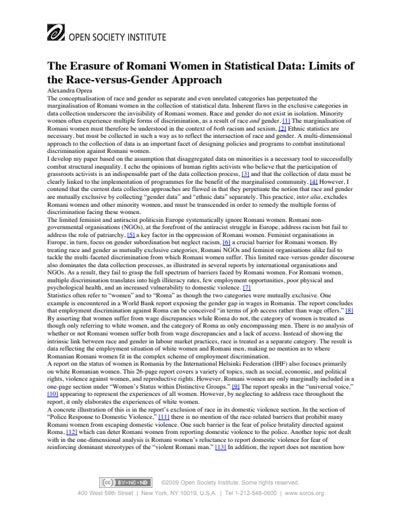Alexandra Oprea presents an article based on the assumption that disaggregated data on minorities is a necessary tool to successfully combat structural inequality. She echos the opinions of human rights activists who believe that the participation of grassroots activists is an indispensable part of the data collection process, and that the collection of data must be clearly linked to the implementation of programs for the benefit of the marginalized community.
However, she argues that the current data collection approaches are flawed in that they perpetuate the notion that race and gender are mutually exclusive by collecting “gender data” and “ethnic data” separately. Oprea concludes that this practice, inter alia, excludes Romani women and other minority women, and must be transcended in order to remedy the multiple forms of discrimination facing these women.
Download
-
The Erasure of Romani Women in Statistical Data: Limits of the Race-versus-Gender Approach (171.03 Kb pdf file)
Download the complete article.
Read more
Voices In Depth
Inside the Archives: George Soros and the Fight for Roma Dignity

For over 40 years, George Soros has been the leading private supporter of Europe’s Roma—the continent’s largest and most excluded ethnic minority—championing Roma leaders in their fight for equality and against deep-rooted discrimination.
Roma Rights
A New Roma-led Vision of Power

The new, independent, Roma Foundation for Europe is backed by a €100 million pledge that builds on Open Society’s over 30 years of support for Roma causes.
Roma Rights
Q&A: A Step Toward Justice for Roma Women

In November, the Slovak Republic formally apologized to Roma women for a program of forced sterilizations that stretched out for decades. How a Slovak human rights group helped hold the government accountable.
